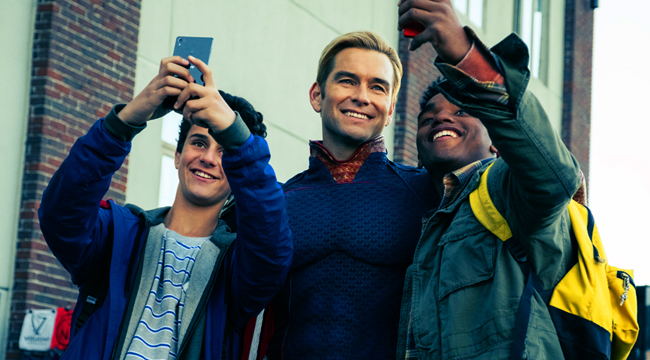
When Garth Ennis wrote The Boys comic book series in 2005, he zeroed in on the idea of corrupt superheroes controlled by corporate overlords via a U.S. presidential directive. Nearly fifteen years later, another controversial figure is in the White House, and Ennis’ story feels as timely as ever — even if its premise is about a group of vigilantes taking out caped heroes who closely resemble some beloved Marvel and D.C. characters dominating the box office — while Amazon prepares to launch the TV series adaptation from Eric Kripke, Seth Rogen, and Evan Goldberg.
We chatted with Ennis about why he’s never been a fan of the rise of superhero culture, and how, despite its mind-bending action and gory violence, The Boys presents one of the more realistic superhero universes out there.
This show really makes us question our fandom of superheroes — if they existed in the real world and were, well, a**holes. Are there certain heroes you modeled The Seven after on the show?
Well, I don’t like any of them. You can pick your favorite and watch me denigrate them. The thing is, due to a quirk of distribution and growing up in Northern Ireland in the ’70s and ’80s, I never really saw American superhero comics. Not often enough or for long enough that I was able to really get into them. I grew up on British comics until I was well into my teens. I was reading material very, very different from what you see in the American superhero tradition. I think coming to them as, pretty much, an adult, I responded to them the way adults did in those days, which is, “This makes no sense. This is ridiculous. This is silly.” That’s where the suspicion and disdain arose.
Are you surprised to see people still crave superhero content to the degree that they do?
Considering the state the world is in, I’m not terribly surprised by people resorting to fantasy. I’m always a little reluctant when I see people making that choice, but I do see where, in a world like this one, when things have gotten as wretched as they have, where that longing for fantasy has. Beyond that, I think there is a long human tradition of praying that a man will come from the sky to save you. Generally, hasn’t worked out too well, but I understand where the instinct comes from.
You created The Boys nearly 15 years ago. but after I watched a few episodes, it seems like you might as well have written this story yesterday. How do you feel about the timing of the show?
Well, if you’re talking about the superheroes, it’s worked out quite well because mainstream film and TV audiences, I think, [accept] the notion of the shared universe. In a wider sense, I began writing The Boys in 2005. It was the beginning of the second Bush administration. So really, that’s why the book involves so much corporate infiltration of government, so much corruption, so much abuse of power. I said earlier that I think that that’s one of the reasons it’s still relevant today. What the Bush administration lacked was that kind of unfeigned, unstable element that we see in the Oval Office today. Whatever else you say about George W. Bush, he was very much a creature of the establishment. The current occupant of the Oval Office is not.
As surreal as this show is, the supes in it are eerily realistic. They’re basically powered-up celebrities, influencers who wield way too much authority and we see the corporate overlords try to control that. For you, what’s the connection between celebrity branding and the idolization of these characters?
Superheroes are really a kind of … they’re kind of brands made real, brands personified. In that sense, I think they would carry enormous power that could be exploited. My theory on superheroes in the real world would be that they’d be a strange combination of rock stars and politicians. They’d have that glamorous facade and public adulation, and so on, but on the other hand, they would have a genuine effect on our world. And that is where the corporate interest would come from.
Is it more terrifying to have celebrities wielding political power?
Potentially, yes, because what you would have is a sort of a Jesus figure. The potential there for corruption is just enormous. You’ve seen a little bit of it in the last few years, when one man can stand up in front of many, and before you know it, change millions of minds.
You’ve said The Butcher is your favorite character. How does Karl Urban measure up?
I think Karl’s absolutely nailed it. I think the idea of a terrible world run by bad men with perhaps an even worse man rising to combat them, to fight against them, which is what Butcher is — I think they’ve brought that across quite handsomely. That, to me, is what the show is all about. It’s a terrible world. Bad men run it. Bad men will be your guide to it. And the worse guy of all, he’s the guy you’ve got fighting for you, which is quite a scary concept if you think about it.
It’s bleak, but that’s what people love about your work, right?
I think so. I mean, yeah, you might say that in the last few years, I’m probably down to about my last inch of idealism.
Amazon Studios’ ‘The Boys’ will stream on July 26.
